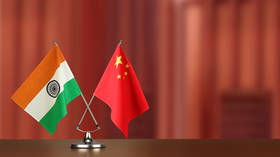Hot mic exposes Biden on China
The US president told the leaders of Indo-Pacific countries that Beijing is “testing us all” with its “aggressive” policy
US President Joe Biden has been caught on a hot mic claiming that China is “testing” Washington and its allies in the Indo-Pacific, during a meeting with the leaders of Japan, India, and Australia on Saturday.
The remark came at a meeting in Biden’s home town of Wilmington, Delaware, with Indian Prime Minister Narendra Modi, Japanese Prime Minister Fumio Kishida, and Australian Prime Minister Anthony Albanese.
The summit of the informal Quad grouping comprising Australia, India, Japan, and the US focused on strengthening cooperation between its members.
After the leaders delivered their opening remarks before the press, the outgoing US president’s comments were caught on hot mic as he claimed that Chinese President Xi Jinping is “looking to buy himself some diplomatic space, in my view, to aggressively pursue China’s interest.”
“China continues to behave aggressively, testing us all across the region, and it’s true in the South China Sea, the East China Sea, South China, South Asia and the Taiwan Straits,” Biden was heard saying as reporters were leaving the venue, in what was supposed to be behind-closed-doors comment.
A senior Biden administration official sought to downplay the remarks, saying there was no need to elaborate on them.
“I don’t think it’ll be much of a surprise that our inside voice matches our outside voice,” the official stated.
The Quad leaders made no direct mention of China in their joint declaration, while expressing concerns over Beijing’s growing influence in the region. China is engaged in hotly contested territorial disputes in both the South China Sea and the East China Sea.
China has dubbed the Quad an “Asia-Pacific version of NATO,” whose aim is to “pursue regional deterrence” in a bid to make it the “dominant mechanism for cooperation” in the Indo-Pacific region and contain Chinese influence.
Beijing has also accused the US-led bloc of encouraging Japan and South Korea to interfere in what it called “China’s internal affairs” on issues such as the South China Sea and the Taiwan Straits.






Comments are closed.